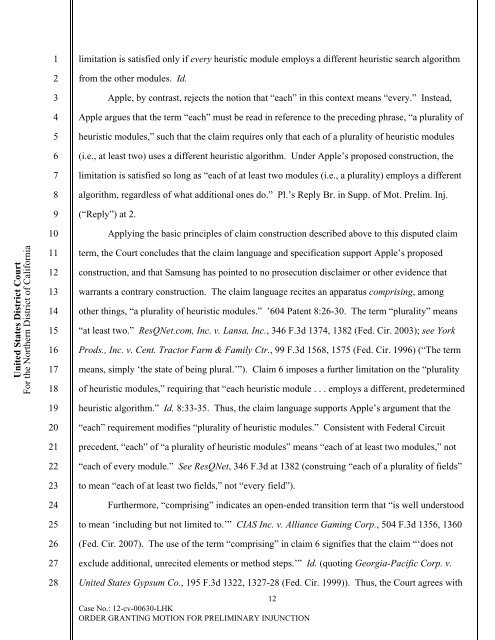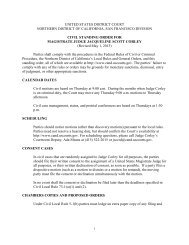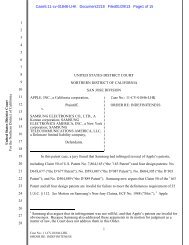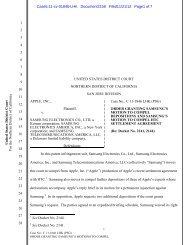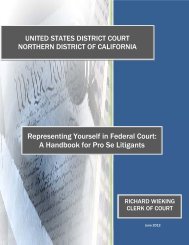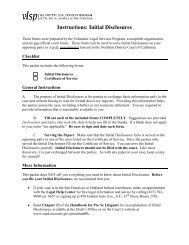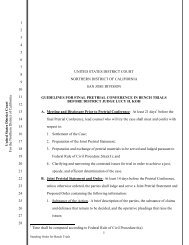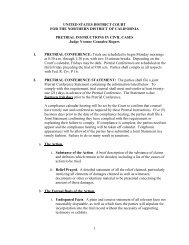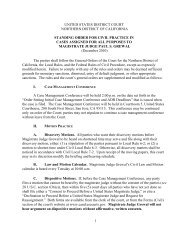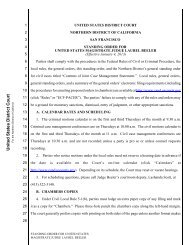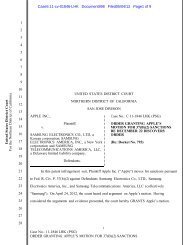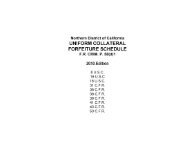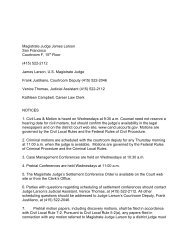Order Granting Motion For Preliminary Injunction - United States ...
Order Granting Motion For Preliminary Injunction - United States ...
Order Granting Motion For Preliminary Injunction - United States ...
Create successful ePaper yourself
Turn your PDF publications into a flip-book with our unique Google optimized e-Paper software.
<strong>United</strong> <strong>States</strong> District Court<br />
<strong>For</strong> the Northern District of California<br />
1<br />
2<br />
3<br />
4<br />
5<br />
6<br />
7<br />
8<br />
9<br />
10<br />
11<br />
12<br />
13<br />
14<br />
15<br />
16<br />
17<br />
18<br />
19<br />
20<br />
21<br />
22<br />
23<br />
24<br />
25<br />
26<br />
27<br />
28<br />
limitation is satisfied only if every heuristic module employs a different heuristic search algorithm<br />
from the other modules. Id.<br />
Apple, by contrast, rejects the notion that “each” in this context means “every.” Instead,<br />
Apple argues that the term “each” must be read in reference to the preceding phrase, “a plurality of<br />
heuristic modules,” such that the claim requires only that each of a plurality of heuristic modules<br />
(i.e., at least two) uses a different heuristic algorithm. Under Apple’s proposed construction, the<br />
limitation is satisfied so long as “each of at least two modules (i.e., a plurality) employs a different<br />
algorithm, regardless of what additional ones do.” Pl.’s Reply Br. in Supp. of Mot. Prelim. Inj.<br />
(“Reply”) at 2.<br />
Applying the basic principles of claim construction described above to this disputed claim<br />
term, the Court concludes that the claim language and specification support Apple’s proposed<br />
construction, and that Samsung has pointed to no prosecution disclaimer or other evidence that<br />
warrants a contrary construction. The claim language recites an apparatus comprising, among<br />
other things, “a plurality of heuristic modules.” ’604 Patent 8:26-30. The term “plurality” means<br />
“at least two.” ResQNet.com, Inc. v. Lansa, Inc., 346 F.3d 1374, 1382 (Fed. Cir. 2003); see York<br />
Prods., Inc. v. Cent. Tractor Farm & Family Ctr., 99 F.3d 1568, 1575 (Fed. Cir. 1996) (“The term<br />
means, simply ‘the state of being plural.’”). Claim 6 imposes a further limitation on the “plurality<br />
of heuristic modules,” requiring that “each heuristic module . . . employs a different, predetermined<br />
heuristic algorithm.” Id. 8:33-35. Thus, the claim language supports Apple’s argument that the<br />
“each” requirement modifies “plurality of heuristic modules.” Consistent with Federal Circuit<br />
precedent, “each” of “a plurality of heuristic modules” means “each of at least two modules,” not<br />
“each of every module.” See ResQNet, 346 F.3d at 1382 (construing “each of a plurality of fields”<br />
to mean “each of at least two fields,” not “every field”).<br />
Furthermore, “comprising” indicates an open-ended transition term that “is well understood<br />
to mean ‘including but not limited to.’” CIAS Inc. v. Alliance Gaming Corp., 504 F.3d 1356, 1360<br />
(Fed. Cir. 2007). The use of the term “comprising” in claim 6 signifies that the claim “‘does not<br />
exclude additional, unrecited elements or method steps.’” Id. (quoting Georgia-Pacific Corp. v.<br />
<strong>United</strong> <strong>States</strong> Gypsum Co., 195 F.3d 1322, 1327-28 (Fed. Cir. 1999)). Thus, the Court agrees with<br />
12<br />
Case No.: 12-cv-00630-LHK<br />
ORDER GRANTING MOTION FOR PRELIMINARY INJUNCTION


